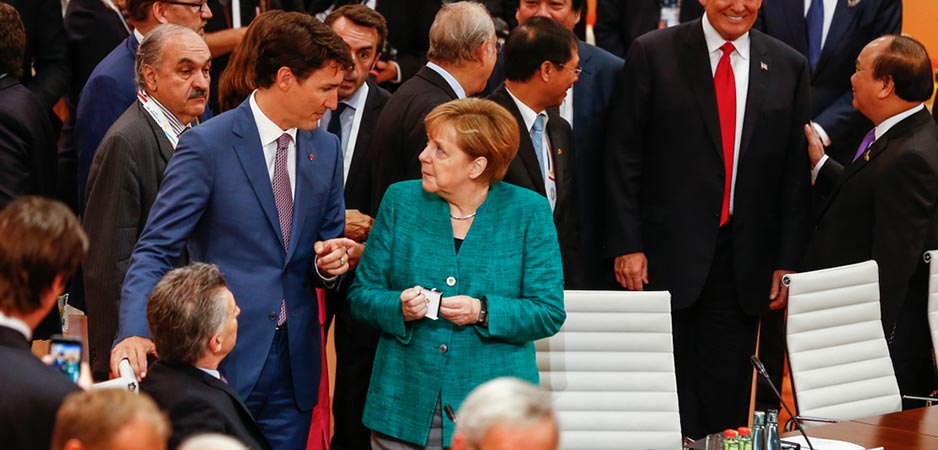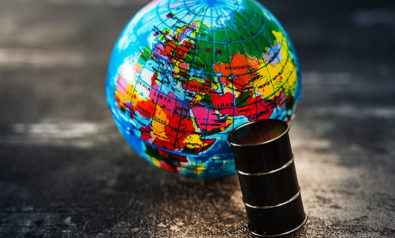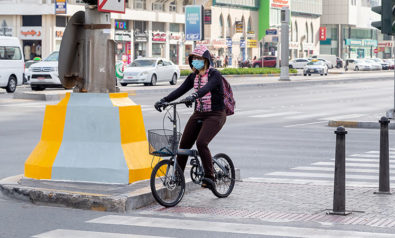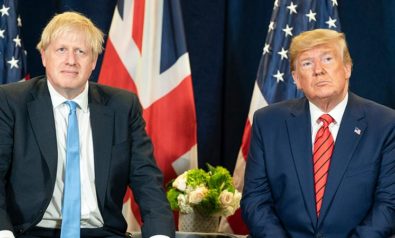It is welcome news that the G20, representing the world’s biggest economies and 90% of global GDP, met via teleconference on March 26 to discuss the health and economic crisis caused by the novel coronavirus, which leads to the COVID-19 disease. It has been obvious for several weeks that coordinated international action was needed.
Given that the G20 was founded in order to deal with crises — particularly the global financial crisis of 2007-08 — it is amazing that it has taken the Saudi presidency of the G20 so long to convene a meeting. The Saudis were pressed into doing so by India.
One Antidote to Coronavirus: More Multilateralism
In 2008, when the G20 first convened, there was a reasonable relationship between the two biggest world powers, the US and China. Gordon Brown of the UK was the chair, and a substantial program of action was agreed and implemented. The financial stability board was set up, and a global set of actions to stabilize banks was agreed and put into motion. China led the way in stimulating its economy through infrastructure spending, and this helped to get the global economy going again. Germany and Europe benefited from this through exports.
Now that lives, not just livelihoods, are at stake, an even more vigorous program of action is needed from the G20. The US and China must stop sniping at one another and start cooperating. Washington and Beijing coming together to work on this global threat would give hope to the world.
When the COVID-19 crisis broke out in the Chinese city of Wuhan in December 2019, Japan set a good example that the US might now follow. Japan sent protective equipment to Wuhan, and Japanese MPs donated part of their salaries to the virus containment efforts in China. This was a remarkable gesture in light of the previous public hostility between these countries, which dates back to World War II.
The WHO and Trade
The COVID-19 crisis has revealed how much we all depend on the chronically-underfunded World Health Organization (WHO). In recent budgetary proposals, the White House actually proposed halving the US contribution to the WHO. Instead, all G20 members should agree to double their contributions to the organization.
Trade barriers, many of them recently enforced, are also hindering efforts to save lives. John W.H. Denton, the secretary-general of the International Chamber of Commerce in Paris, wrote in the Financial Times that “the recent escalation of trade barriers is now wreaking havoc in key medical supply chains.” For example, restrictions on the export of life-saving equipment — including masks, test kits, disinfectants and ventilators — have been introduced by some countries. Global trade in test kits is worth $186 billion and that in disinfectants is around $308 billion.
The Global Trade Alert team in Switzerland says that damaging export bans have been introduced by a number of countries, including Bulgaria, France, India, the UK, South Korea and even by Saudi Arabia itself. In the case of ventilators, export restrictions would be particularly damaging. In Africa, there is no firm that is capable of manufacturing ventilators, while there is only one throughout Latin America. Even the countries that do have manufacturing capacity will have to import some components. Even soap and disinfectants have to be imported by most countries. There are 78 countries that impose tariffs on soap and 23 nations place tariffs on disinfectants. This is crazy under the present circumstances.
The G20 should decide that all barriers to trade in goods, including soap, which the World Customs Organization (WCO) has said is critical to fighting the coronavirus, should be lifted straight away. The European Union should abolish its own export authorization system for ventilators as it will slow down production and cost lives, especially in the poorest countries of the world.
EU Action
The G20 also needs to consider the long-term economic effect of the shutdown in global economic activity. Big countries with big tax bases can protect themselves and their firms. Germany has introduced a huge aid package for German firms. Yet an Italian company that produces the same product as a German one may not receive the same aid as its German competitor, and this sort of issue could destroy the level playing field of the EU single market.
No country derives as much benefit proportionately as Ireland does from the existence of a fair and open single market in the European Union. So, Ireland should back EU coordination of business support to ensure that all firms — whether from big or small countries — can compete fairly.
The European Central Bank has taken welcome steps to help Italy and other heavily indebted countries affected by the coronavirus pandemic to borrow at reasonable interest rates. But that simply adds to their debts. Collective EU action, financed by collective EU borrowing, in support of particular health-related spending should be undertaken. At the moment, the union can neither raise taxes nor borrow, and that means it is unable to cope with crises like this one.
There are three steps that should be considered. First, there should be an immediate elimination of all tariffs and restrictions on the export or import of goods identified by the WCO as vital to fighting COVID-19. Second, a mutual assistance program to help countries with the greatest shortage of equipment and intensive care beds should be launched. Finally, medical staff who have been tested should be exempt from immigration restrictions to allow them to go where they are needed most.
The views expressed in this article are the author’s own and do not necessarily reflect Fair Observer’s editorial policy.
Support Fair Observer
We rely on your support for our independence, diversity and quality.
For more than 10 years, Fair Observer has been free, fair and independent. No billionaire owns us, no advertisers control us. We are a reader-supported nonprofit. Unlike many other publications, we keep our content free for readers regardless of where they live or whether they can afford to pay. We have no paywalls and no ads.
In the post-truth era of fake news, echo chambers and filter bubbles, we publish a plurality of perspectives from around the world. Anyone can publish with us, but everyone goes through a rigorous editorial process. So, you get fact-checked, well-reasoned content instead of noise.
We publish 2,500+ voices from 90+ countries. We also conduct education and training programs
on subjects ranging from digital media and journalism to writing and critical thinking. This
doesn’t come cheap. Servers, editors, trainers and web developers cost
money.
Please consider supporting us on a regular basis as a recurring donor or a
sustaining member.
Will you support FO’s journalism?
We rely on your support for our independence, diversity and quality.
































